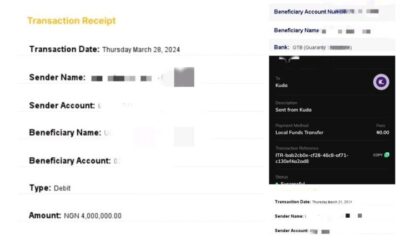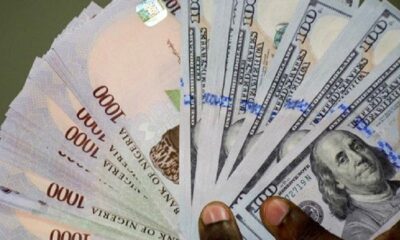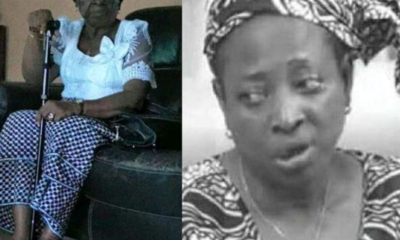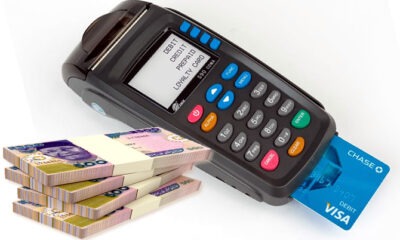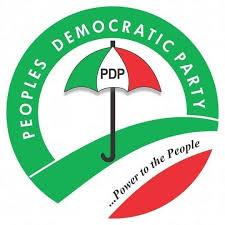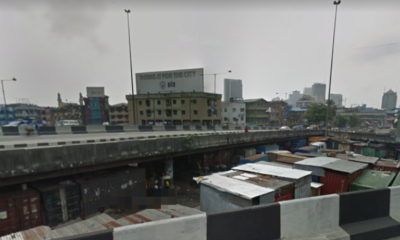Business
Forex Scarcity Persists As CBN Resumes Intervention
Published
11 months agoon
By
Editor
…Banks ignore CBN’s directive on domiciliary accounts
There are indications that banks are ignoring the Central Bank of Nigeria, CBN, directive that they should grant their customers unfettered withdrawal of foreign currencies from domiciliary accounts.
Meanwhile, Nigeria’s foreign exchange market has recorded a drastic change following the market reforms introduced by the CBN, previous week.
Financial Vanguard findings show that the banks are still restricting the amount of foreign currency that customers can withdraw from their accounts saying the currencies are still scarce.
Dealers and the customers who spoke to Financial Vanguard lamented that the situation has impeded supply of foreign currency to the market.
But the drastic change in both structure and operations of the foreign exchange market, according to the Financial Vanguard findings has resulted in exchange rate convergence by default as the US dollar traded within narrow band across the three segments of the market, namely, the Investors and Exporters (I&E) window, the Bureau De Changes (BDCs) and the black market.
However, for the first time, the exchange rate in the official market (I&E) surpassed what obtained in the black market.
Meanwhile, dealers across all the segments are facing acute scarcity of the US dollars while CBN resumed supply of the foreign currency last week, though at a very low volume.
Findings by Financial Vanguard show that Naira last week depreciated further to N770.17 per dollar in the I&E window, with currency dealers projecting further deterioration of the dollar scarcity, a situation which may propel further depreciation of the local currency this week.
READ ALSO: Naira Depreciates Further In Investors, Exporters Window.
According to data from FMDQ, the I&E window exchange rate closed at N770.17 per dollar on Friday. This represents 16.2 per cent week-on-week, WoW, depreciation of the Naira when compared with the closing rate of N663.04 per dollar the previous week.
The Naira also depreciated in the parallel market, where the dollar traded within the range of N765 and N770 per dollar, at the close of business, up from N759 per dollar the previous week.
The Naira has been on the downward trend in both the official market and parallel market, since the Central Bank of Nigeria, CBN announced, “Operational Changes to the Foreign Exchange Market,” including elimination of multiple exchange rates/segments and re-introduction of willing seller, willing buyer model in the I&E window.
Since the changes were announced the previous week, the Naira has depreciated by 63 per cent in the I&E window, from N471.67 per dollar on Tuesday June 13th.
During the same period, the Naira also depreciated by 20 per cent in the parallel market from N755 per dollar.
Dollar scarcity
Financial Vanguard findings from currency dealers showed that the depreciation is driven by acute dollar scarcity in both I&E and the parallel market.
A banker and forex market analyst who spoke on condition of anonymity told Vanguard, “Though the CBN intervened in the I&E window on Thursday, the market is still very short, in terms of supply. The volume of sales by the CBN was not much. The highest volume sold per buyer was $5 million dollars. Some others got $2.5 million while others got between $250,000 and $1 million.
READ ALSO: Naira Appreciates by 1.79% At Investors, Exporters Window
“They, however, sold only to people that bided at an exchange rate above $761 per dollar.
“After the CBN’s sales, some international organisations also sold but the volume was small compared to the demand, especially given the backlog of matured obligations. I will say the market is still evolving and going through a price discovery process. The volatility will continue with the Naira further depreciating, depending on dollar supply coming into the I&E window.
“The true exchange rate will only emerge when all the backlog of dollar demand has been satisfied.”
Operators react
Bureaux De Change, BDC, operators and parallel market operators who spoke to Financial Vanguard lamented the dollar scarcity in the market, noting that banks are yet to comply with the directive of the CBN that they should allow customers have unfettered access to funds in their domiciliary accounts.
Mallam Ahmed Yunusa, a black market trader in Lagos, said: “The market has been very busy since last week after the CBN eased its restrictions on forex trading in banks.
“A dollar was sold for N770 today (last Friday) because I bought a dollar for N765 making just N5 profit. However, over the week, the dollar has been traded at N745 to N770.
“The reason for this is because most of our customers who visited the banks complained the demand for dollars is higher than the supply and that the banks don’t have enough dollars to go round hence the rise in the price for the willing buyers.
“Most traders at the parallel market decided to sell a bit less or higher within the price range of banks to keep our customers as the competition becomes tougher.
“I see a continuous rise in the volume of demand for the dollar as we approach the end of the year and an appreciation of the Naira to N500 or N600 per dollar in the near term if dollar supply increases.”
READ ALSO: Naira Float: Nigerian Billionaires Lose $5.85bn — Bloomberg
On his part, Mallam Umoru Mohammed, another black market trader in Lagos, said: “The dollar has been trading since last week from N740 to N770. Today the dollar was traded at N750.
“Here in Ikorodu, businesses have been dull as not many sold dollars to us hence I was not able to get supply of dollars due to the higher demand of dollars than supply.
“I see the Naira depreciating to N800 per dollar due to the inability of traders to meet the demands of buyers as we approach the remaining half of the year but if there is more forex inflows the reverse will be the case.”
Similarly, Garuba Hassan, a parallel market operator also in Lagos, said: “Today (last Friday) we are buying at N750 per dollar, but yesterday the rate was between N760 and N770 per dollar. If you go to the banks, they will tell you no dollars. You will have to visit about three banks before you can get the dollars, and this is affecting the market and the rate.”
Speaking on condition of anonymity, a Bureaux De Change, BDC, operator, and executive member of Association of Bureaux De Change Operators of Nigeria, ABCON, said: “There is nothing like BDC exchange rate because the CBN is not selling dollars to BDCs. We all compete with the parallel market operators for dollars and as such we have to ensure our rates match theirs.
“The situation in the market now is that demand is high but dollars are still scarce because there is no supply.
“People that want to withdraw dollars from their domiciliary account are not able to do so. The banks keep telling them there are no dollars.
“But I believe the Naira will appreciate in the coming weeks. The sharp depreciation of the Naira in the I&E window, I believe, is to encourage investors and Nigerians in Diaspora to bring in their dollars.
“Once this happens, the exchange rate in both I&E and the parallel market will gradually go down.”
VANGUARD
You may like


Find The Man Who Stole $30000 From Me, Get $2000 Reward – Nigerian Man Cries Out


Dangote Speaks On Devaluation Of Naira


Mixed Reactions Trail Video Of Couple’s Customised N200 Notes


Naira Abuse: EFCC To Arraign Cubana Chief Priest Wednesday


Naira Abuse: ‘Ask Bob For Update’ – EFCC Issues Threat To Culprits


Naira Appreciation Continues Despite Drop In FX Turnover
Business
CAC Opens Centre For Registration Of PoS Operators
Published
3 days agoon
May 9, 2024By
Editor
The Corporate Affairs Commission has inaugurated a centre for bulk registration of Point of Sale operators in its database.
The CAC Registrar-General, Hussaini Magaji, said this while inaugurating the centre stationed at its Federal Capital Territory Office in Abuja on Wednesday.
According to Magaji, the importance of registering the PoS operators in the commission’s database cannot be over emphasised.
He said the centre was well equipped with all the necessary facilities to operate 24 hours a day and ensure the commission’s achievement of its purpose.
READ ALSO: ICYMI: FG To Delist Naira From P2P Platforms
“What we did was accommodate the request from the Fintechs.
“We have allowed them to integrate with the Corporate Affairs Commission; they have developed their structure, and we gave them access.
“Once they supply the necessary details for registration on their platform, the certificate is generally generated and transmitted directly to their platform without them having to contact anyone.
“We have done this to ensure that everyone gets it easy without hitches, but if they choose to apply manually, we have a secretariat open for them to do so,” he stated.
READ ALSO: ICYMI: FG Gives Deadline To PoS Operators To Register With CAC
Recall that the Federal Government through the CAC on Tuesday issued a two-month registration deadline to Point of Sales companies, to register their agents, merchants, and individuals with the commission in line with legal requirements and the directives of the Central Bank of Nigeria.
Meanwhile, at the event, the registrar-general reiterated that the centre would be opened to all operators in the fintech industry who voluntarily submitted their agents and merchants for regularisation with the CAC.
Magaji said that the registration was in line with President Bola Tinubu’s desire to ensure financial inclusion for the youth and strengthen the fight against fraud, finance and other crimes in the country.
He further expressed his resolve to ensure compliance with the provisions of Section 863 (1) of the Companies and Allied Matters, CAMA 2020, and the CBN guidelines for Agent Banking, 2013.
READ ALSO: ICYMI: Five Things To Know About The New Cybersecurity Levy To Be Paid By Nigerians
On security, the CAC boss said that if a crime were committed using the PoS, the government would easily trace the perpetrators to the CAC data platform if such machines were registered.
“If an incident happens and they report it to CAC, if we do not have the operator’s details, we cannot respond, and that is the essence of this registration.
“The registration ensures that every detail of the person is provided, including NIN, passport photograph and all other useful documents.
“And it is an opportunity for more people to be captured into the formal sector,” he said.
The News Agency of Nigeria reports that the Special Adviser to the President on ICT Development and Innovation, Tokoni Peter attended the event.
The event was attended by Dr Salihu Dasuki, the Special Adviser to the President on ICT Policy Office, the PoS operators, and other stakeholders.
(NAN)
Business
FULL LIST: CBN Publishes List Of Licensed Deposit Money Banks
Published
3 days agoon
May 8, 2024By
Editor
The Central Bank of Nigeria has released a comprehensive list of licensed Deposit Money Banks operating within the country.
The list, which was made public on the CBN’s official website on Tuesday, provides insights into the banking landscape in Nigeria.
Banks with international authorisation include Access Bank Limited, Fidelity Bank Plc, First City Monument Bank Limited, First Bank Nigeria Limited, Guaranty Trust Bank Limited, United Bank of Africa Plc, and Zenith Bank Plc.
READ ALSO: BDC Operators Arrested As Naira Sells 1,416/$
Commercial banks with national authorisation include Citibank Nigeria Limited, Ecobank Nigeria Limited, Heritage Bank Plc, Globus Bank Limited, Keystone Bank Limited, Polaris Bank Limited, Stanbic IBTC Bank Limited, Standard Chartered Bank Limited, Sterling Bank Limited, Titan Trust Bank Limited, Union Bank of Nigeria Plc, Unity Bank Plc, Wema Bank Plc, Premium Trust Bank Limited and Optimus Bank Limited.
Commercial banks with regional licenses are Providus Bank Limited, Parallex Bank Limited, Suntrust Bank Nigeria Limited, and Signature Bank Limited.
Players in the non-interest banking sector with national authorisation include Jaiz Bank Plc, Taj Bank Limited, Lotus Bank Limited, and Alternative Bank Limited.
READ ALSO: [ICYMI]FULL LIST: 16 Banking Transactions Exempted From CBN’s New
In the merchant banking category, the apex banks listed, are Coronation Merchant Bank Limited, FBN Merchant Bank Limited, FSDH Merchant Bank Limited, Greenwich Merchant Bank Limited, Nova Merchant Bank Limited, and Rand Merchant Bank Limited.
The financial holding companies listed were Access Holdings Plc, FBN Holdings Plc, FCMB Group Plc, FSDH Holding Company Limited, Guaranty Trust Holding Company Plc, Stanbic IBTC Holdings Plc, and Sterling Financial Holdings Limited.
The Mauritius Commercial Bank Representative Office (Nigeria) Limited was listed as the sole representative office.
Business
[ICYMI]FULL LIST: 16 Banking Transactions Exempted From CBN’s New
Published
4 days agoon
May 7, 2024By
Editor
The Central Bank of Nigeria on Monday directed all banks to commence charging a 0.5 per cent cybersecurity levy on all electronic transactions within the country.
The apex bank stated this in a circular signed by the Director, Payments System Management Department, Chibuzo Efobi; and the Director, Financial Policy and Regulation Department, Haruna Mustafa; a copy of which was obtained by The PUNCH.
The circular, which was directed to all commercial, merchant, non-interest, and payment service banks, among others; noted that the implementation of the levy would start two weeks from Monday, May 6, 2024.
READ ALSO: Five Things To Know About The New Cybersecurity Levy To Be Paid By Nigerians
“The levy shall be applied at the point of electronic transfer origination, then deducted and remitted by the financial institution. The deducted amount shall be reflected in the customer’s account with the narration, ‘Cybersecurity Levy,’” the circular partly read.
In this piece, The PUNCH highlights all the 16 banking transactions that are exempted from the CBN’s new cybersecurity levy:
Loan disbursements and repayments
Salary payments
Intra-account transfers within the same bank or between different banks for the same customer
Intra-bank transfers between customers of the same bank
Other Financial Institutions instructions to their correspondent banks
Interbank placements,
Banks’ transfers to CBN and vice-versa
Inter-branch transfers within a bank
Cheque clearing and settlements
Letters of Credits
READ ALSO: FG To Delist Naira From P2P Platforms
Banks’ recapitalisation-related funding – only bulk funds movement from collection accounts
Savings and deposits, including transactions involving long-term investments such as Treasury Bills, Bonds, and Commercial Papers.
Government Social Welfare Programmes transactions e.g. Pension payments
Non-profit and charitable transactions, including donations to registered non-profit organisations or charities
Educational institutions’ transactions, including tuition payments and other transactions involving schools, universities, or other educational institutions
Transactions involving bank’s internal accounts such as suspense accounts, clearing accounts, profit and loss accounts, inter-branch accounts, reserve accounts, nostro and vostro accounts, and escrow accounts.

Kogi University Lecturer Stripped Over Alleged Sexual Harassment

Banditry: Niger Speaker To Marry Off 100 Female Orphans

Edo Poll: Reason Ex-Speaker Resigns From PDP Revealed
Trending

 Headline5 days ago
Headline5 days agoICYMI: Pandemonium During Church Service As Man Pulls Gun, Attempts To Shoot Pastor [VIDEO]

 Headline4 days ago
Headline4 days agoMother Throws Disabled 6-year-old Son Into Crocodile Infested River [PHOTOS]

 News4 days ago
News4 days ago‘I’m Considering Having 4th Child’ – Mother Of Three Who Breastfeeds Husband , 3 Kids [PHOTOS]

 News3 days ago
News3 days agoThe New Masquerade’ Actress, Ovularia Is Dead

 Business4 days ago
Business4 days agoICYMI: FG Gives Deadline To PoS Operators To Register With CAC

 Headline4 days ago
Headline4 days ago‘Shame On You’- Ugandan Senator Knocked For Showing Off Wooden Bridge He Constructed

 Politics4 days ago
Politics4 days agoEdo Poll: PDP Gubernatorial Aspirant Resigns From Party

 News3 days ago
News3 days agoBREAKING: Rivers State House Of Assembly Gets New Speaker

 Metro5 days ago
Metro5 days agoVIDEO: Lagos Commences Removal Of 100 Adeniji-Adele Shanties

 Metro4 days ago
Metro4 days ago[ICYMI]Rivers: Siblings Flog Teacher, Lock Up Admin Officer For Flogging Brother
